新标准大学英语3 unit2-Cultural Childhoods原文+译文
新标准大学英语综合教程3课文翻译

新标准大学英语综合教程3课文翻译Unit 01 Working Holiday AbroadHow My Working Holiday Changed MeHayley1 Now that I have been home for a while and have had time to reflect on my working holiday in Vancouver, I’ve thought a lot about who I was before I left for Canada and who I am prese ntly.1 我回到家已经有一段时间了,有空回顾在温哥华的打工度假经历。
对于去加拿大之前的自我和如今的自我,我思考了很多。
2 Prior to leaving, I was not in a good place. I had suffered a lot of personal blows and felt emotionally stretched. I lost my grandma, my job and had two car crashes in five months. I needed something to change in my life, and that came in the form of a working holiday visa.2 出发前,我的境况不好。
个人生活上经受了许多打击,精神压力很大。
我失去了我的祖母,我的工作,5个月里遭遇两起车祸。
我需要生活得到改变,于是便有了打工度假签证这回事。
3 In less than three months I filled out the necessary paperwork, booked my plane ticket and fled Brisbane. I spent fifteen months living and working in Vancouver, Canada and eighteen months in total away from Australia. This is how that working holiday changed me and my life.3 在不到三个月的时间里,我填写了所需的表格,订好了机票,逃离布里斯班。
新标准大学英语3课文翻译
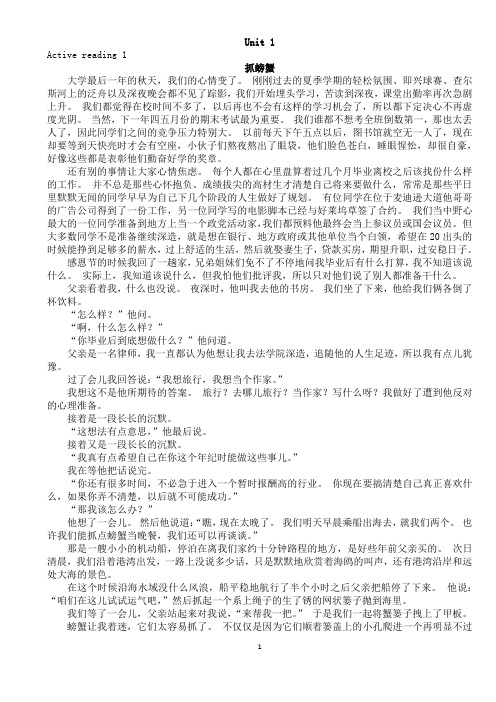
Unit 1Active reading 1抓螃蟹大学最后一年的秋天,我们的心情变了。
刚刚过去的夏季学期的轻松氛围、即兴球赛、查尔斯河上的泛舟以及深夜晚会都不见了踪影,我们开始埋头学习,苦读到深夜,课堂出勤率再次急剧上升。
我们都觉得在校时间不多了,以后再也不会有这样的学习机会了,所以都下定决心不再虚度光阴。
当然,下一年四五月份的期末考试最为重要。
我们谁都不想考全班倒数第一,那也太丢人了,因此同学们之间的竞争压力特别大。
以前每天下午五点以后,图书馆就空无一人了,现在却要等到天快亮时才会有空座,小伙子们熬夜熬出了眼袋,他们脸色苍白,睡眼惺忪,却很自豪,好像这些都是表彰他们勤奋好学的奖章。
还有别的事情让大家心情焦虑。
每个人都在心里盘算着过几个月毕业离校之后该找份什么样的工作。
并不总是那些心怀抱负、成绩拔尖的高材生才清楚自己将来要做什么,常常是那些平日里默默无闻的同学早早为自己下几个阶段的人生做好了规划。
有位同学在位于麦迪逊大道他哥哥的广告公司得到了一份工作,另一位同学写的电影脚本已经与好莱坞草签了合约。
我们当中野心最大的一位同学准备到地方上当一个政党活动家,我们都预料他最终会当上参议员或国会议员。
但大多数同学不是准备继续深造,就是想在银行、地方政府或其他单位当个白领,希望在20出头的时候能挣到足够多的薪水,过上舒适的生活,然后就娶妻生子,贷款买房,期望升职,过安稳日子。
感恩节的时候我回了一趟家,兄弟姐妹们免不了不停地问我毕业后有什么打算,我不知道该说什么。
实际上,我知道该说什么,但我怕他们批评我,所以只对他们说了别人都准备干什么。
父亲看着我,什么也没说。
夜深时,他叫我去他的书房。
我们坐了下来,他给我们俩各倒了杯饮料。
“怎么样?”他问。
“啊,什么怎么样?”“你毕业后到底想做什么?”他问道。
父亲是一名律师,我一直都认为他想让我去法学院深造,追随他的人生足迹,所以我有点儿犹豫。
过了会儿我回答说:“我想旅行,我想当个作家。
新标准大学英语综合教程3课文翻译及课后翻译
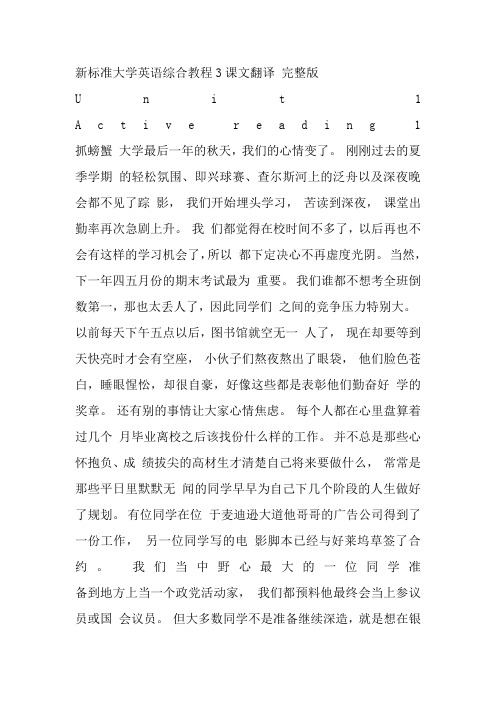
新标准大学英语综合教程3课文翻译完整版U n i t 1 A c t i v e r e a d i n g 1 抓螃蟹大学最后一年的秋天,我们的心情变了。
刚刚过去的夏季学期的轻松氛围、即兴球赛、查尔斯河上的泛舟以及深夜晚会都不见了踪影,我们开始埋头学习,苦读到深夜,课堂出勤率再次急剧上升。
我们都觉得在校时间不多了,以后再也不会有这样的学习机会了,所以都下定决心不再虚度光阴。
当然,下一年四五月份的期末考试最为重要。
我们谁都不想考全班倒数第一,那也太丢人了,因此同学们之间的竞争压力特别大。
以前每天下午五点以后,图书馆就空无一人了,现在却要等到天快亮时才会有空座,小伙子们熬夜熬出了眼袋,他们脸色苍白,睡眼惺忪,却很自豪,好像这些都是表彰他们勤奋好学的奖章。
还有别的事情让大家心情焦虑。
每个人都在心里盘算着过几个月毕业离校之后该找份什么样的工作。
并不总是那些心怀抱负、成绩拔尖的高材生才清楚自己将来要做什么,常常是那些平日里默默无闻的同学早早为自己下几个阶段的人生做好了规划。
有位同学在位于麦迪逊大道他哥哥的广告公司得到了一份工作,另一位同学写的电影脚本已经与好莱坞草签了合约。
我们当中野心最大的一位同学准备到地方上当一个政党活动家,我们都预料他最终会当上参议员或国会议员。
但大多数同学不是准备继续深造,就是想在银行、地方政府或其他单位当个白领,希望在 20 出头的时候能挣到足够多的薪水,过上舒适的生活,然后就娶妻生子,贷款买房,期望升职,过安稳日子。
感恩节的时候我回了一趟家,兄弟姐妹们免不了不停地问我毕业后有什么打算,我不知道该说什么。
实际上,我知道该说什么,但我怕他们批评我,所以只对他们说了别人都准备干什么。
父亲看着我,什么也没说。
夜深时,他叫我去他的书房。
我们坐了下来,他给我们俩各倒了杯饮料。
“怎么样?”他问。
“啊,什么怎么样?”“你毕业后到底想做什么?”他问道。
父亲是一名律师,我一直都认为他想让我去法学院深造,追随他的人生足迹,所以我有点儿犹豫。
新标准大学英语三课文参考翻译
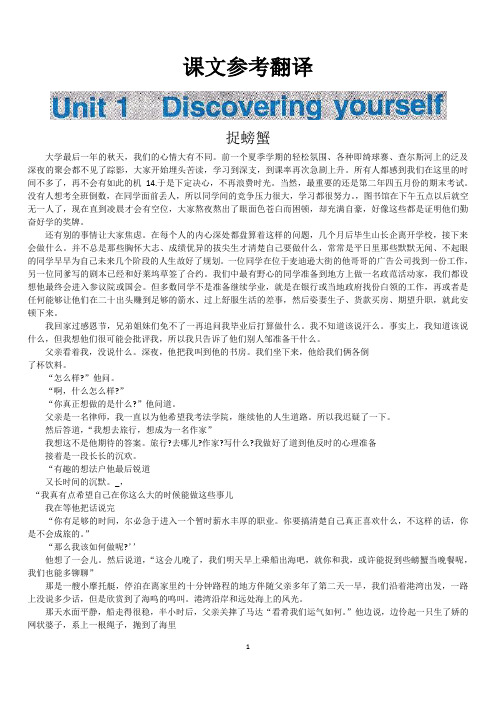
课文参考翻译捉螃蟹大学最后一年的秋天,我们的心情大有不同。
前一个夏季学期的轻松氛围、各种即绮球赛、查尔斯河上的泛及深夜的聚会都不见了踪影,大家开始埋头苦读,学习到深支,到课率再次急剧上升。
所有人都感到我们在这里的时间不多了,再不会有如此的机14.于是下定决心,不再浪费时光。
当然,最重要的还是第二年四五月份的期末考试。
没有人想考全班倒数,在同学面前丢人,所以同学间的竞争压力很大,学习都很努力。
,图书馆在下午五点以后就空无一人了,现在直到凌晨才会有空位,大家熬夜熬出了眼面色苍白而困顿,却充满自豪,好像这些都是证明他们勤奋好学的奖牌。
还有别的事情让大家焦虑。
在每个人的内心深处都盘算着这样的问题,几个月后毕生山长企离开学校,接下来会做什么。
并不总是那些胸怀大志、成绩优异的拔尖生才清楚自己要做什么,常常是平日里那些默默无闻、不起眼的同学早早为自己未来几个阶段的人生故好了规划。
一位同学在位于麦迪逊大街的他哥哥的广告公司找到一份工作,另一位同爹写的剧本已经和好莱坞草签了合约。
我们中最有野心的同学准备到地方上做一名政范活动家,我们都设想他最终会进入参议院或国会。
但多数同学不是准备继续学业,就是在银行或当地政府找份白领的工作,再或者是任何能够让他们在二十出头赚到足够的箭水、过上舒服生活的差事,然后姿妻生子、货款买房、期望升职,就此安顿下来。
我回家过感恩节,兄弟姐妹们免不了一再追问我毕业后打算做什么。
我不知道该说汗么。
事实上,我知道该说什么,但我想他们很可能会批评我,所以我只告诉了他们别人邹准备干什么。
父亲看着我,没说什么。
深夜,他把我叫到他的书房。
我们坐下来,他给我们俩各倒了杯饮料。
“怎么样?”他问。
“啊,什么怎么样?”“你真正想做的是什么?”他问道。
父亲是一名律师,我一直以为他希望我考法学院,继续他的人生道路。
所以我迟疑了一下。
然后答道,“我想去旅行,想成为一名作家”我想这不是他期待的答案。
旅行?去哪儿?作家?写什么?我做好了道到他反时的心理准备接着是一段长长的沉欢。
新标准大学英语综合教程3课文翻译1-10
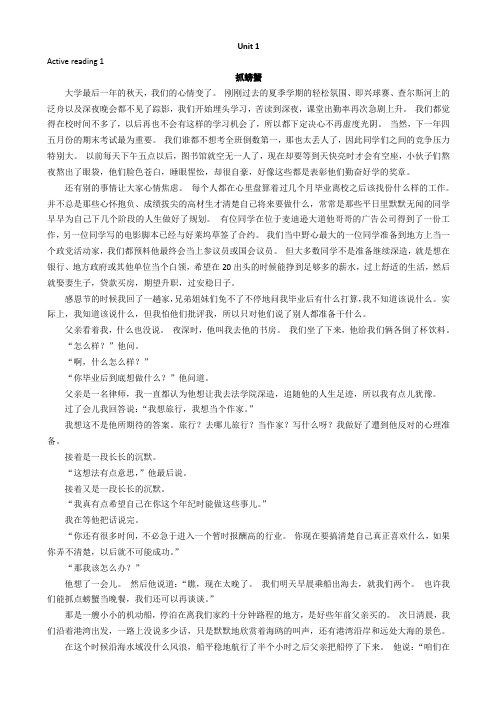
Unit 1Active reading 1抓螃蟹大学最后一年的秋天,我们的心情变了。
刚刚过去的夏季学期的轻松氛围、即兴球赛、查尔斯河上的泛舟以及深夜晚会都不见了踪影,我们开始埋头学习,苦读到深夜,课堂出勤率再次急剧上升。
我们都觉得在校时间不多了,以后再也不会有这样的学习机会了,所以都下定决心不再虚度光阴。
当然,下一年四五月份的期末考试最为重要。
我们谁都不想考全班倒数第一,那也太丢人了,因此同学们之间的竞争压力特别大。
以前每天下午五点以后,图书馆就空无一人了,现在却要等到天快亮时才会有空座,小伙子们熬夜熬出了眼袋,他们脸色苍白,睡眼惺忪,却很自豪,好像这些都是表彰他们勤奋好学的奖章。
还有别的事情让大家心情焦虑。
每个人都在心里盘算着过几个月毕业离校之后该找份什么样的工作。
并不总是那些心怀抱负、成绩拔尖的高材生才清楚自己将来要做什么,常常是那些平日里默默无闻的同学早早为自己下几个阶段的人生做好了规划。
有位同学在位于麦迪逊大道他哥哥的广告公司得到了一份工作,另一位同学写的电影脚本已经与好莱坞草签了合约。
我们当中野心最大的一位同学准备到地方上当一个政党活动家,我们都预料他最终会当上参议员或国会议员。
但大多数同学不是准备继续深造,就是想在银行、地方政府或其他单位当个白领,希望在20出头的时候能挣到足够多的薪水,过上舒适的生活,然后就娶妻生子,贷款买房,期望升职,过安稳日子。
感恩节的时候我回了一趟家,兄弟姐妹们免不了不停地问我毕业后有什么打算,我不知道该说什么。
实际上,我知道该说什么,但我怕他们批评我,所以只对他们说了别人都准备干什么。
父亲看着我,什么也没说。
夜深时,他叫我去他的书房。
我们坐了下来,他给我们俩各倒了杯饮料。
“怎么样?”他问。
“啊,什么怎么样?”“你毕业后到底想做什么?”他问道。
父亲是一名律师,我一直都认为他想让我去法学院深造,追随他的人生足迹,所以我有点儿犹豫。
过了会儿我回答说:“我想旅行,我想当个作家。
新标准大学英语综合教程3课文翻译

美国国家教育统计中心的数据表明,大约80%的美国大下学生至少要换一次专业。
有些学生上大学时就读父母或亲戚为他们选择的专业。
在大多数情况下,这些学生难以做出决定,因为他们不知道在决定变换被规划好的职业的时候该如何面对自己的亲人。
有些学生决定转专业是因为他们无法应付所学专业的基础课,而另一些学生则是因为他们实在厌恶所学的专业,必须换一个自已真.正喜欢的专业。
专家认为,意识到所学专业不适合自己的技能和天赋没什么错。
实际上,能意识到这一点是成熟的标志。
重要的是找到一个真正适合你的专业。
在转;专业之前,你需要见学业导师,跟教授或专业人员谈谈,做一些调查,问自己几个严肃的问题,看看你的选择是否正确。
Translation 2Reference: :As the Chinese saying goes, it is important to know oneself,The first person to put forward this no tion was Laozi, whowrote in his book Dao De Jing: "A person who knows othersis intelligent, but a person who knows himself is insightful."To <know oneself is to have a correct understanding ofo neself, including one's strengths and limitations, and to beclear-minded about what one can do, We cherish this virtueso much precisely because it is really hard for people toknow themsel ves. Knowing oneself is both part of aphilosophy of life and a virtue that can facilitateself- improv ement and attainment of a higher life goal.在西方,做父母的非常了解受父母过度保护的孩子的弱:点:这些孩子害怕冒险,缺乏决断力,缺少在现实生活中获得成功的手段; 上大学时,许多人无法较好地适应大学生活的严苛,退学是常有的事。
新标准大学英语三unit2

Text
These changing ideas about children have led many social scientists to claim that childhood is a "social construction". They use this term to mean that understandings of childhood are not the same everywhere and that while all societies acknowledge that children are different from adults, how they are different and what expectations are placed on them, change according to the society in which they live.
Text
Text
Cultural Childhoods
1
When I look back on my own childhood in the 1970s
and 1980s and compare it with children today, it reminds me of that famous sentence "The past is
Text
There's a tendency to view children in the UK, and in the Western world in general, as incompetent and dependent. But this isn't the case throughout the world. In many societies children work and contribute to the family in whatever way they can from a very early age. A good example of this is childcare. In the UK, it is illegal for a child under the age of 14 to look after another child unsupervised, because they're deemed incompetent and irresponsi are thought of as mischievous; they cry or want to feed simply because they are naughty, and beatings are at their most severe between the ages of three and five when children are seen as particularly wilful. Parents believe that social competence can only be achieved through discipline and physical punishment, and treat their children in ways that have seemed very harsh to outsiders.
新标准大学英语综合教程3课文与课后翻译unit2
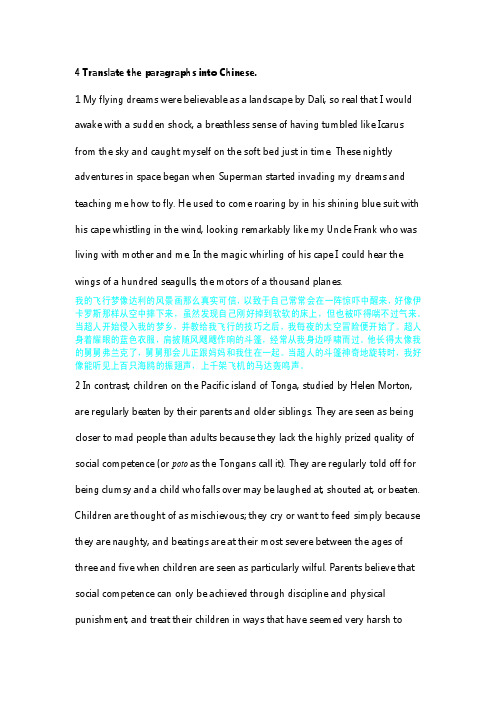
4 Translate the paragraphs into Chinese.1 My flying dreams were believable as a landscape by Dali, so real that I would awake with a sudden shock, a breathless sense of having tumbled like Icarus from the sky and caught myself on the soft bed just in time. These nightly adventures in space began when Superman started invading my dreams and teaching me how to fly. He used to come roaring by in his shining blue suit with his cape whistling in the wind, looking remarkably like my Uncle Frank who was living with mother and me. In the magic whirling of his cape I could hear the wings of a hundred seagulls, the motors of a thousand planes.我的飞行梦像达利的风景画那么真实可信,以致于自己常常会在一阵惊吓中醒来,好像伊卡罗斯那样从空中摔下来,虽然发现自己刚好掉到软软的床上,但也被吓得喘不过气来。
当超人开始侵入我的梦乡,并教给我飞行的技巧之后,我每夜的太空冒险便开始了。
超人身着耀眼的蓝色衣服,肩披随风飕飕作响的斗篷,经常从我身边呼啸而过。
他长得太像我的舅舅弗兰克了,舅舅那会儿正跟妈妈和我住在一起。
新标准大学英语3 unit2-Cultural Childhoods原文+译文
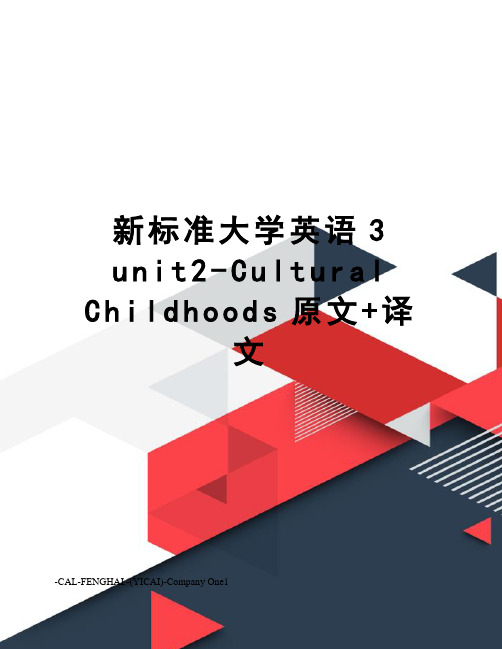
新标准大学英语3u n i t2-C u l t u r a l C h i l d h o o d s原文+译文-CAL-FENGHAI.-(YICAI)-Company One1Cultural Childhoods不同文化的童年1 When I look back on my own childhood in the 1970s and 1980s and compare it with children today, it reminds me of that famous sentence "The past is a foreign country: They do things differently there" (from L. P. Hartley's novel The Go-Between). Even in a relatively short period of time, I can see the enormous transformations that have taken place in children's lives and in the ways they arethought about and treated.每当我回顾20世纪七八十年代我的童年时光,并将它与现在孩子的童年相比较时,就会想起句名言:“往昔是异国他乡,那里有着不同的习俗”(可参见L.P.哈特利的小说《传信人》)。
甚至在相对短暂的一段时间内,我也能够察觉到儿童的生活以及人们对待儿童的方式上所经历的巨大变化。
2.Looking further back I can see vast differences between contemporary and historical childhoods. Today, children have few responsibilities, their lives are characterized by play not work, school not paid labour, family rather than public life and consumption instead of production. Yet this is all relatively recent. A hundred years ago, a 12 year old working in a factory would have been perfectly acceptable. Now, it would cause social services' intervention and the prosecution of both parents and factory owner.回顾更久远的岁月,我可以看到现在和古代童年生活的巨大差别。
新标准大学英语3课后翻译单元(中英对照)

新标准大学英语3 课后翻译〔中英对照〕:Unit1:英译汉:1 、We all sensed we were coming to the end of our stay here, that we would never get a chance like this again, and we became determined not to waste it. Most important of course were the final exams in April and May in the following year. No one wanted the humiliation of finishing last in class, so the peer group pressure to work hard was strong. Libraries which were once empty after five o’clock in the afternoon were standing room only until the early hours of the morning, and guys wore the bags under their eyes and their pale, sleepy faces with pride, like medals proving their diligence. (☞and guys wore the bags under their eyes and their pale, sleepy faces with pride …这句的动词wear 后面带两个宾语,中文找不到能带这两个宾语的动词,故处理成四个中文短句;翻译 like medals proving their diligence时,采用“增词法〞增加“这些〞来概括前面所描写的“眼袋〞,“脸色苍白〞,“睡眼惺忪〞等,使译文含义更加明晰流畅。
新标准大学英语综合教程3课文翻译及课后翻译

新标准大学英语综合教程3课文翻译完整版U n i t 1 A c t i v e r e a d i n g 1 抓螃蟹大学最后一年的秋天,我们的心情变了。
刚刚过去的夏季学期的轻松氛围、即兴球赛、查尔斯河上的泛舟以及深夜晚会都不见了踪影,我们开始埋头学习,苦读到深夜,课堂出勤率再次急剧上升。
我们都觉得在校时间不多了,以后再也不会有这样的学习机会了,所以都下定决心不再虚度光阴。
当然,下一年四五月份的期末考试最为重要。
我们谁都不想考全班倒数第一,那也太丢人了,因此同学们之间的竞争压力特别大。
以前每天下午五点以后,图书馆就空无一人了,现在却要等到天快亮时才会有空座,小伙子们熬夜熬出了眼袋,他们脸色苍白,睡眼惺忪,却很自豪,好像这些都是表彰他们勤奋好学的奖章。
还有别的事情让大家心情焦虑。
每个人都在心里盘算着过几个月毕业离校之后该找份什么样的工作。
并不总是那些心怀抱负、成绩拔尖的高材生才清楚自己将来要做什么,常常是那些平日里默默无闻的同学早早为自己下几个阶段的人生做好了规划。
有位同学在位于麦迪逊大道他哥哥的广告公司得到了一份工作,另一位同学写的电影脚本已经与好莱坞草签了合约。
我们当中野心最大的一位同学准备到地方上当一个政党活动家,我们都预料他最终会当上参议员或国会议员。
但大多数同学不是准备继续深造,就是想在银行、地方政府或其他单位当个白领,希望在 20 出头的时候能挣到足够多的薪水,过上舒适的生活,然后就娶妻生子,贷款买房,期望升职,过安稳日子。
感恩节的时候我回了一趟家,兄弟姐妹们免不了不停地问我毕业后有什么打算,我不知道该说什么。
实际上,我知道该说什么,但我怕他们批评我,所以只对他们说了别人都准备干什么。
父亲看着我,什么也没说。
夜深时,他叫我去他的书房。
我们坐了下来,他给我们俩各倒了杯饮料。
“怎么样?”他问。
“啊,什么怎么样?”“你毕业后到底想做什么?”他问道。
父亲是一名律师,我一直都认为他想让我去法学院深造,追随他的人生足迹,所以我有点儿犹豫。
新标准大学英语综合教程3课文翻译_珍藏版
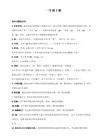
我们所谓的激动人心的时代其实很乏味
为激动人心的时代也许真的很乏味。
就拿“坏事成三”这种想法来说吧(就像等公交车一样,要么不来,要么一下来三辆!)。 这种流传甚广的观念可能根本经不起科学的检验,但是它必定有一些现实的依据,不然的话也不会有这么个说法了。 那么,什么样的解释才是合理的呢?
理东西。 父亲可能会带着孩子去他干活的地方,让他看着自己修马车,或是打桌子。 要是孩子问“爸爸,您是干什么的?”,爸爸会用孩子能理解的语言回答他,比如:“我是修蒸汽机的”,或者“我是做马项圈的”。
礼上才送偶数数量的花。
著居民一样,根据阴历来过节,而这又完全是另外一回事儿了。
去欧洲寻求更好的生活。 他们向从事此项非法生意的黑帮支付高达两千欧元的费用,可是旅途极不舒服,卫生条件极其恶劣,而且还要遭受烈日的暴晒。这还算好的了,有时候,那些严重超载的船只到不了对岸,几天之后海水会把他们的尸体冲到欧洲南部的海滩上。 那些到达蓝佩杜萨岛的人则被迅速集中起来,押送到拘留中心,由那里的官员决定是否允许他们“避难”,允许避难就是给移民居住权。 许多人会被遣送回家,有些人则偷偷地登陆,躲开了移民官——但他们往往没有意识到他们是在一个小岛上,当他们去向当地人打听火车站的位置时,当地人会感到很吃惊。
回纽约的时候会给孩子们带几条小鳄鱼。 后来短吻鳄越长越大,不像小时候那么可爱了。大人们只好把它们扔进抽水马桶里冲掉。 但是其中一些短吻鳄活了下来,所以现在有一些成年短吻鳄在纽约曼哈顿街区下面游荡。
年年初,我们三个人聚在一起,设计了研究方案。 方案决定让我接受八个有关音乐技巧训练的测试,涵盖各种音乐活动,比如高音音准练习、音阶和节奏练习。 我还要学唱两首歌,一首是约翰 ? 拉特的《盖尔人的祝祷文》,另一首是亨德尔的《请让我哭泣吧》。 听帕姆唱这两首歌,让我想起了写这本书的动力:为什么进化会创造出这样的一个物种,拥有如此美妙的歌喉?
新标准大学英语综合教程3课文翻译_完整版
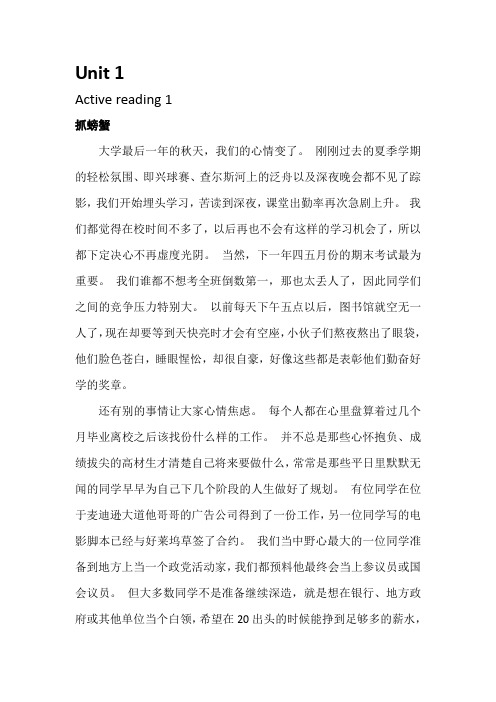
Unit 1Active reading 1抓螃蟹大学最后一年的秋天,我们的心情变了。
刚刚过去的夏季学期的轻松氛围、即兴球赛、查尔斯河上的泛舟以及深夜晚会都不见了踪影,我们开始埋头学习,苦读到深夜,课堂出勤率再次急剧上升。
我们都觉得在校时间不多了,以后再也不会有这样的学习机会了,所以都下定决心不再虚度光阴。
当然,下一年四五月份的期末考试最为重要。
我们谁都不想考全班倒数第一,那也太丢人了,因此同学们之间的竞争压力特别大。
以前每天下午五点以后,图书馆就空无一人了,现在却要等到天快亮时才会有空座,小伙子们熬夜熬出了眼袋,他们脸色苍白,睡眼惺忪,却很自豪,好像这些都是表彰他们勤奋好学的奖章。
还有别的事情让大家心情焦虑。
每个人都在心里盘算着过几个月毕业离校之后该找份什么样的工作。
并不总是那些心怀抱负、成绩拔尖的高材生才清楚自己将来要做什么,常常是那些平日里默默无闻的同学早早为自己下几个阶段的人生做好了规划。
有位同学在位于麦迪逊大道他哥哥的广告公司得到了一份工作,另一位同学写的电影脚本已经与好莱坞草签了合约。
我们当中野心最大的一位同学准备到地方上当一个政党活动家,我们都预料他最终会当上参议员或国会议员。
但大多数同学不是准备继续深造,就是想在银行、地方政府或其他单位当个白领,希望在20出头的时候能挣到足够多的薪水,过上舒适的生活,然后就娶妻生子,贷款买房,期望升职,过安稳日子。
感恩节的时候我回了一趟家,兄弟姐妹们免不了不停地问我毕业后有什么打算,我不知道该说什么。
实际上,我知道该说什么,但我怕他们批评我,所以只对他们说了别人都准备干什么。
父亲看着我,什么也没说。
夜深时,他叫我去他的书房。
我们坐了下来,他给我们俩各倒了杯饮料。
“怎么样?”他问。
“啊,什么怎么样?”“你毕业后到底想做什么?”他问道。
父亲是一名律师,我一直都认为他想让我去法学院深造,追随他的人生足迹,所以我有点儿犹豫。
过了会儿我回答说:“我想旅行,我想当个作家。
新标准大学英语综合教程3课后答案
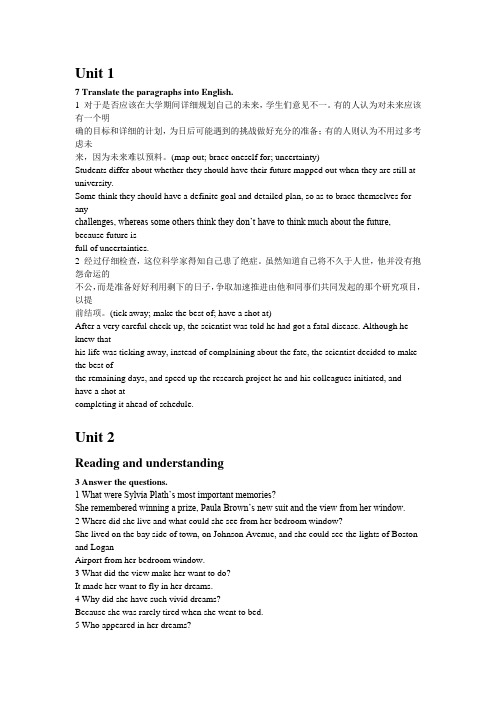
Unit 17 Translate the paragraphs into English.1 对于是否应该在大学期间详细规划自己的未来,学生们意见不一。
有的人认为对未来应该有一个明确的目标和详细的计划,为日后可能遇到的挑战做好充分的准备;有的人则认为不用过多考虑未来,因为未来难以预料。
(map out; brace oneself for; uncertainty)Students differ about whether they should have their future mapped out when they are still at university.Some think they should have a definite goal and detailed plan, so as to brace themselves for anychallenges, whereas some others think they don’t have to think much about the future, because future isfull of uncertainties.2 经过仔细检查,这位科学家得知自己患了绝症。
虽然知道自己将不久于人世,他并没有抱怨命运的不公,而是准备好好利用剩下的日子,争取加速推进由他和同事们共同发起的那个研究项目,以提前结项。
(tick away; make the best of; have a shot at)After a very careful check-up, the scientist was told he had got a fatal disease. Although he knew thathis life was ticking away, instead of complaining about the fate, the scientist decided to make the best ofthe remaining days, and speed up the research project he and his colleagues initiated, and have a shot atcompleting it ahead of schedule.Unit 2Reading and understanding3 Answer the questions.1 What were Sylvia Plath’s most important memories?She remembered winning a prize, Paula Brown’s new suit and the view from her window.2 Where did she live and what could she see from her bedroom window?She lived on the bay side of town, on Johnson Avenue, and she could see the lights of Boston and LoganAirport from her bedroom window.3 What did the view make her want to do?It made her want to fly in her dreams.4 Why did she have such vivid dreams?Because she was rarely tired when she went to bed.5 Who appeared in her dreams?Superman appeared and taught her to fly.6 Why did she enjoy the radio adventures of Superman?Because she loved the sheer poetry of flight.7 Where did her friend and she play Superman?At the dingy back entrance to the school, an alcove in a long passageway.Unit 2 Childhood memories468 Why do you think they chose Sheldon to be the villain?Because he was a mamma’s boy and was left out of the other boys’ games.9 How did she feel about her Uncle Frank?She admired him as she thought he bore an extraodinary resemblance to Superman incognito.4 Choose the best summary of the passage.3 Sylvia Plath wrote about her real and imaginary life as a child.Dealing with unfamiliar words5 Match the words in the box with their definitions.1 accurate and true (definite)2 continuing all the time (perpetual)3 to spin quickly in circles (whirl)4 to shine very brightly (blaze)5 to laugh in a nervous, excited or silly way that is difficult to control (giggle)6 to encourage someone to speak or continue speaking (prompt)7 to fall to the ground (tumble)6 Complete the paragraph with the correct form of the words in Activity 5.Plath never needed to be (1) prompted to talk about her childhood memories. They were very (2) definiteand still real to her as an adult. She imagined she could fly and (3) whirl through the air like Superman.Coming from the highways around Boston was the (4) perpetual sound of traffic. In the distance a planewas taking off, its lights (5) blazing into the night sky. She remembered the sound of (6) giggling whichcame from the group of girls. Sadly in her later life it seemed as if Superman had (7) tumbled to earth.7 Replace the underlined words with the correct form of the words in the box.1 The lights at the airport went on and off all day and night. (blinked)2 The playground was like a desert. It was without any interesting or positive features and unfriendly.(barren)3 The boys were playing a children’s game in which the play ers chase and try to touch each other and thegirls were gossiping and giggling. (tag)4 Pulling the legs off insects is a form of action causing extreme physical pain by someone as apunishment, and is extremely cruel. (torture)5 The similarity in appearance between the twins was striking. (resemblance)6 He would cover candy with a piece of cloth used for cleaning lips and hands, and make it disappear.(napkin)8 Answer the questions about the words and expressions.1 If you look through a kaleidoscope, are you likely to see (a) changing coloured patterns, or(b) a singlecoloured pattern?2 If you flaunt something, do you (a) deliberately try to make people notice, or (b) try to hide it?3 If you marvel at something, do you find it (a) boring, or (b) surprising and fascinating? Childhood memories Unit 2474 Are shooting stars likely to (a) move brightly through the night sky, or (b) stand still?5 Is the twilight likely to be (a) at the end of, or (b) in the middle of the day?6 If you drift off to sleep, are you likely to fall asleep (a) quickly, or (b) slowly?7 If someone is bookish, are they likely to be (a) more, or (b) less interested in reading books than doingother activities?8 If you make up something, do you (a) invent it, or (b) borrow it from someone else?9 If you come into your own, are you likely to show (a) how effective and useful, or (b) ineffective anduseless you can be?10 Is a villain likely to be a (a) good, or (b) bad person?11 If you are left out of something, are you likely to be (a) included, or (b) excluded? Active reading (2)Language points1 These changing ideas about children have led many social scientists to claim that childhood is a“social construction”. (Para 4)A social construction refers to the process or result of creating an idea or system of behaviour in socialcontexts, ie it is created and developed between people and is not something natural or genetic.Childhood memories Unit 2532 Social anthropologists have shown this in their studies of peoples ... (Para 5)Social anthropologists are scholars and researchers who study human societies, customs and beliefsfrom a social perspective, which may be distinct from the focus of physical anthropologists or linguisticanthropologists.3 Because they can’t be reasoned with, and don’t understand, parents treat them with a great deal oftolerance and leniency. (Para 5)Tolerance is the attitude of someone who is willing to accept other people’s beliefs or way of life withoutcriticizing them even if they disagree with them. The word leniency means giving a punishment or actingin a way that is not as severe or harsh as it could be.4 They are seen as being closer to mad people than adults because they lack the highly prized qualityof social competence … (Para 6)Something is prized if it is considered to be very important or valuable. The examples in the passageemphasize how different cultural communities may give importance to quite different qualities which theyexpect from children, so the children are brought up very differently.5 They are regularly told off for being clumsy and a child who falls over may be laughed at, shoutedat, or beaten. (Para 6)To tell someone off means to criticize someone angrily for doing something wrong. If you are told off fordoing something in a serious or official way, you are reprimanded.6 Looking at it from a cross-cultural perspective shows the wide variety of childhoods that exist acrossthe world … (Para 11)A cross-cultural perspective is a view which considers different cultures separately or independently andthen makes comparisons. An intercultural perspective would look at the relations and interactions betweendifferent cultures or communities, taking inside views of each culture into account. A transculturalperspective would look at different cultures using knowledge, skills and insights which are thought toapply to a wide range of cultural contexts and which would help people in intercultural contexts.Reading and understanding3 Read the passage again and complete the table.Teaching tips• When Ss have completed the table on their own, divide the class into seven groups, each groupbeing responsible for one row in the table. They have to summarize the characteristics of childhoodof this ethnic group, and also include an example. Then they report to the class. Each group shouldalso add related information they learned from the passage, and the language and culture notes. Thepresentation of each group could be given from that exact roles of parents from that exact cultural orethnic group. If this is difficult, T may give each group a copy of the example below, and ask them topractise and present it to the class.• As a way to follow this up, T can ask each group, one by one, to compare their result with that ofanother group, without looking at their books. An alternative follow-up is for the T, together withone or two Ss, to take the roles of TV reporters who meet each group and ask them ―on camera‖ tocompare themselves with another group, and talk about how they understand the other group from across-cultural perspective.Unit 2 Childhood memories544 Choose the best way to complete the sentences.1 The characteristics of childhood a hundred years ago (d) .(a) would have interfered in their education(b) are similar to those of today(c) would be illegal today(d) meant that children were treated more like adults2 The idea that childhood is a social construction suggests that (a) .(a) children experience childhood in different ways according to the society in which they live(b) enormous transformations have taken place within a relatively short time(c) children in the past worked harder(d) all children are different from adults3 Both Inuit and Tongan parents understand that (b) .(a) their children need to be treated in a way which would be considered harsh by outsiders(b) their children don’t yet possess certain prized qualities, such as reasoning and social competence(c) growing up is a process of acquiring thought, not social skills(d) bringing up their children requires tolerance and discipline4 Parents of Beng children treat them with great care because they (d) .(a) think children know all human languages and understand all cultures(b) think life in the earthly world is unpleasant(c) believe the children still live in a spirit world(d) fear the children may choose to return to the spirit world where they lived before they were born5 Western childcare practices (c) .(a) include allowing eight-year-old girls to work and 12-year-old girls to marry(b) treat the child in a bizarre and possibly harmful way(c) see the child as being incompetent, dependent on the parents, and incapable of looking after other children(d) are only similar to Yanamamö childcare practices in that girls help out at home, and boys are allowedto play well into their teens6 The main idea of the passage is that (c) .(a) history shows us how our perception of childhood has changed(b) childhood is viewed in different ways according to the child’s cultural and social upbringing(c) both history and society can affect our perception of childhood(d) Western notions of childhood are outdated and not informed(continued)Unit 2 Childhood memories56Dealing with unfamiliar words5 Read the passage again and find the words in the box. Choose the best definition in the context of thepassage.1 consumption(a) the process of buying or using goods(b) the process of eating, drinking, or smoking something2 colonial(a) relating to a system or period in which one country rules another(b) made in a style that was common in North America in the 18th century3 knit(a) to make something such as a piece of clothing using wool and sticks called knitting needles(b) to join together or work together as one group or unit4 harsh(a) unpleasant and difficult to live in(b) strict, unkind, and often unfair5 contact(a) communication between people, countries, or organizations either by talking or writing(b) a situation in which people or things touch each other6 impose(a) to force someone to have the same opinion, belief as you(b) to cause extra work for someone by asking them to do something that may not be convenient for them7 perspective(a) a way of thinking about something(b) a sensible way of judging how good, bad, important etc something is in comparison with other things6 Replace the underlined words with the correct form of the words and expressions in the box.Our (1) knowledge and understanding of childhood is undergoing a process of (2) nonstop change. Inthe West we see children as being (3) in need of adult control. However, among other (4) socio-culturalgroups with similar traditions children are (5) mainly considered to be capable of assuming greaterresponsibilities. So there is a (6) strong desire for (7) someone who does not belong to this group tothink that such practices might be odd or even harmful. But while most ethnic groups may at first show(8) hesitation about integrating other traditions and customs with their own, (9) outside pressures usuallymake them change their traditional view of childhood.Key: (1) notion (2) continual (3) dependent on (4) ethnic (5) largely(6) temptation (7) an outsider (8) reluctance (9) external7 Answer the questions about the words and expressions.1 Is prosecution likely to be (a) the act of accusing someone of a crime, or (b) the process of supervisionby the social services?Childhood memories Unit 2572 Is intricate likely to be (a) very basic, or (b) very detailed in design?3 Is leniency likely to involve (a) kindness and understanding, or (b) strict discipline?4 If someone tells you off, are they (a) criticizing, or (b) praising you?5 Is a mischievous child likely to (a) be well behaved, or (b) enjoy having fun by causing trouble?6 If a child is wilful, are they likely to cause damage or harm (a) deliberately, or (b) by mistake?7 When a child is unsupervised, are they likely to be (a) looked after by adults, or (b) without an adultlooking after them?8 Is something bizarre likely to be (a) strange and difficult to explain, or (b) very usual? Language in useunpacking complex sentences1 Look at the sentences from the passage Superman and answer the questions.1 My flying dreams were believable as a landscape by Dali, so real that I would awake with a suddenshock, a breathless sense of having tumbled like Icarus from the sky and caught myself on thejust in time.(a) What were believable?Her dreams about flying were believable.(b) How real were they?They were very real.Unit 2 Childhood memories60(c) Who had the sense of having tumbled like Icarus?The writer, Sylvia Plath.(d) Why would she wake up with a breathless sense?Because she felt she was really flying.(e) What did the breathless sense feel like?It felt like a sudden shock.(f) Why did she catch herself on the soft bed just in time?Because she felt she was falling.2 We even found a stand-in for a villain in Sheldon Fein, the sallow mamma’s boy on our block who wasleft out of the boys’ games because he cried whenever anybody tagged him and always managed to falldown and skin his fat knees.(a) What did we find?We found someone who could be a villain.(b) Who was the stand-in for a villain?Sheldon Fein.(c) What was he like?He was sallow and a mamma’s boy.(d) Where did he come from?He came from their block.(e) Why was he left out of the boys’ games?Because he always cried and fell over.(f) What happened when he always managed to fall down?He skinned his knees.2 Rewrite the sentence from the passage Cultural childhoods in a diagram below.He has written how a Yanamamö girl is expected to help her mother from a young age and by the age often will be running a house.3 Complete the sentences with the correct form of suitable expressions from the collocation box.Sometimes more than one collocation is possible.1 The Australian bush fires blazed for several days before they were brought under control.2 As a child Ruth’s long dark hair tumbled down her back.3 He comes from a very close-knit / tight-knit family with three brothers and two sisters.4 I remember my father used to knit his brows / eyebrows together when he was thinking hardsomething.5 It was extremely hot and the sun was blazing.Hehaswrittenhow aYanomamö girlfrom a youngage andwill be runninga houseis expected to helpher motherby the age of tenChildhood memories Unit 2616 Did you knit that jumper / hat yourself? It’s really beautiful!7 I’m watching the financial markets – I think the prices of stocks will tumble quite soon.4 Translate the paragraphs into Chinese.1 My flying dreams were believable as a landscape by Dali, so real that I would awake with a suddenshock, a breathless sense of having tumbled like Icarus from the sky and caught myself on the softbed just in time. These nightly adventures in space began when Superman started invadingmydreams and teaching me how to fly. He used to come roaring by in his shining blue suit with his capewhistling in the wind, looking remarkably like my Uncle Frank who was living with mother andme. In the magic whirling of his cape I could hear the wings of a hundred seagulls, the motors of athousand planes.我的飞行梦像达利的风景画那么真实可信,以致于自己常常会在一阵惊吓中醒来,好像伊卡罗斯那样从空中摔下来,虽然发现自己刚好掉到软软的床上,但也被吓得喘不过气来。
新标准大学英语3Culturalchildhood概述.
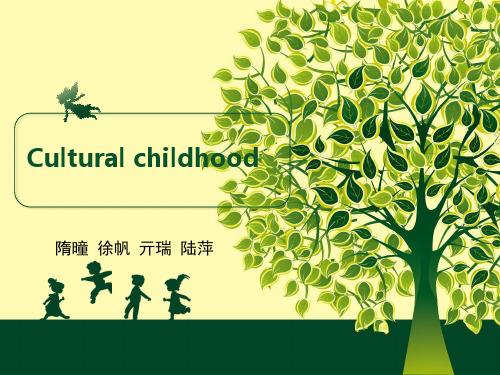
sentence
2、These changing ideas about children have led many social
scientists to claim that childhood is a “social construction”. They use this term to mean that understandings of childhood are not the same everywhere and that while all societies acknowledge that children are different from adults, how they are different and what expectations are placed on them, change according to the society in which they live. (p4)
American colonial: expected to be good and industrious Inuit: develop a process of acquiring thought, reason and understanding Tonga: regular beaten and told off by parents and older siblings, seen as being very naughty, until they develop social competence Beng: treated with great care and reverence, believed that they are in contact with the spirit world Western world today: seen as incompetent and irresponsible; playing not working, consumption instead of production Fulani: competent and responsible; expected to work Yanamamo: competent and responsible; girls expected to work from a young age, be married and have a children at 12 or 13;boys have fewer responsibilities and getting married later
新标准大学英语综合教程3课文翻译

新标准⼤学英语综合教程3课⽂翻译新标准⼤学英语综合教程3课⽂翻译(完整版)Unit 1Active reading 1抓螃蟹⼤学最后⼀年的秋天,我们的⼼情变了。
刚刚过去的夏季学期的轻松氛围、即兴球赛、查尔斯河上的泛⾈以及深夜晚会都不见了踪影,我们开始埋头学习,苦读到深夜,课堂出勤率再次急剧上升。
我们都觉得在校时间不多了,以后再也不会有这样的学习机会了,所以都下定决⼼不再虚度光阴。
当然,下⼀年四五⽉份的期末考试最为重要。
我们谁都不想考全班倒数第⼀,那也太丢⼈了,因此同学们之间的竞争压⼒特别⼤。
以前每天下午五点以后,图书馆就空⽆⼀⼈了,现在却要等到天快亮时才会有空座,⼩伙⼦们熬夜熬出了眼袋,他们脸⾊苍⽩,睡眼惺忪,却很⾃豪,好像这些都是表彰他们勤奋好学的奖章。
还有别的事情让⼤家⼼情焦虑。
每个⼈都在⼼⾥盘算着过⼏个⽉毕业离校之后该找份什么样的⼯作。
并不总是那些⼼怀抱负、成绩拔尖的⾼材⽣才清楚⾃⼰将来要做什么,常常是那些平⽇⾥默默⽆闻的同学早早为⾃⼰下⼏个阶段的⼈⽣做好了规划。
有位同学在位于麦迪逊⼤道他哥哥的⼴告公司得到了⼀份⼯作,另⼀位同学写的电影脚本已经与好莱坞草签了合约。
我们当中野⼼最⼤的⼀位同学准备到地⽅上当⼀个政党活动家,我们都预料他最终会当上参议员或国会议员。
但⼤多数同学不是准备继续深造,就是想在银⾏、地⽅政府或其他单位当个⽩领,希望在20 出头的时候能挣到⾜够多的薪⽔,过上舒适的⽣活,然后就娶妻⽣⼦,贷款买房,期望升职,过安稳⽇⼦。
感恩节的时候我回了⼀趟家,兄弟姐妹们免不了不停地问我毕业后有什么打算,我不知道该说什么。
实际上,我知道该说什么,但我怕他们批评我,所以只对他们说了别⼈都准备⼲什么。
⽗亲看着我,什么也没说。
夜深时,他叫我去他的书房。
我们坐了下来,他给我们俩各倒了杯饮料。
“怎么样?”他问。
“啊,什么怎么样?”“你毕业后到底想做什么?”他问道。
⽗亲是⼀名律师,我⼀直都认为他想让我去法学院深造,追随他的⼈⽣⾜迹,所以我有点⼉犹豫。
新标准大学英语综合教程第三册重点文章及翻译

Unit 1 Catching Crabs1 In the fall of our final year, our mood changed. The relaxed atmosphere of the preceding summer semester, the impromptu ball games, the boating on the Charles River, the late-night parties had disappeared, and we all started to get our heads down, studying late, and attendance at classes rose steeply again. We all sensed we were coming to the end of our stay here, that we would never get a chance like this again, and we became determined not to waste it. Most important of course were the final exams in April and May in the following year. No one wanted the humiliation of finishing last in class, so the peer group pressure to work hard was strong. Libraries which were once empty after five o'clock in the afternoon were standing room only until the early hours of the morning, and guys wore the bags under their eyes and their pale, sleepy faces with pride, like medals proving their diligence.2 But there was something else. At the back of everyone's mind was what we would do next, when we left university in a few months' time. It wasn't always the high flyers with the top grades who knew what they were going to do. Quite often it was the quieter, less impressive students who had the next stages of their life mapped out. One had landed a job in his brother's advertising firm in Madison Avenue, another had got a script under provisional acceptance in Hollywood. The most ambitious student among us was going to work as a party activist at a local level. We all saw him ending up in the Senate or in Congress one day. But most people were either looking to continue their studies, or to make a living with a white-collar job in a bank, local government, or anything which would pay them enough to have a comfortable time in their early twenties, and then settle down with a family, a mortgage and some hope of promotion.3 I went home at Thanksgiving, and inevitably, my brothers and sisters kept asking me what I was planning to do. I didn't know what to say. Actually, I did know what to say, but I thought they'd probably criticize me, so I told them what everyone else was thinking of doing.4 My father was watching me but saying nothing. Late in the evening, he invited me to his study. We sat down and he poured us a drink.5 "So?" he said.6 "Er … so what?"7 "So what do you really want to do?" he asked.8 My father was a lawyer, and I had always assumed he wanted me to go to law school, and follow his path through life. So I hesitated.9 Then I replied, “I want to travel, and I w ant to be a writer.”10 This was not the answer I thought he would expect. Travel? Where? A writer? About what? I braced myself for some resistance to the idea.11 There was a long silence.12 "Interesting idea," he said finally.13 There was another long silence.14 "I kind of wish I'd done that when I was your age."15 I waited.16 "You have plenty of time. You don't need to go into a career which pays well just at the moment. You need to find out what you really enjoy now, because if you don't, you won't besuccessful later."17 "So how do I do this?“18 He thought for a moment. Then he said, "Look, it's late. Let's take the boat out tomorrow morning, just you and me. Maybe we can catch some crabs for dinner, and we can talk more."19 It was a small motor boat, moored ten minutes away, and my father had owned it for years. Early next morning we set off along the estuary. We didn't talk much, but enjoyed the sound of the seagulls and the sight of the estuary coastline and the sea beyond.20 There was no surf on the coastal waters at that time of day, so it was a smooth half-hour ride until my father switched off the motor. "Let's see if we get lucky," he said, picked up a rusty, mesh basket with a rope attached and threw it into the sea.21 We waited a while, then my father stood up and said, "Give me a hand with this," and we hauled up the crab cage onto the deck.22 Crabs fascinated me. They were so easy to catch. It wasn't just that they crawled into such an obvious trap, through a small hole in the lid of the basket, but it seemed as if they couldn't be bothered to crawl out again even when you took the lid off. They just sat there, waving their claws at you.23 The cage was brimming with dozens of soft shell crabs, piled high on top of each other. "Why don't they try to escape?" I wondered aloud to my father.24 "Just watch them for a moment. Look at that one, there! He's trying to climb out, but every time the other crabs pull him back in," said my father.25 And we watched. The crab climbed up the mesh towards the lid, and sure enough, just as it reached the top, one of its fellow crabs reached out, clamped its claw onto any available leg, and pulled it back. Several times the crab tried to defy his fellow captives, without luck.26 "Now watch!" said my father. "He's starting to get bored with this game."27 Not only did the crab give up its lengthy struggle to escape, but it actually began to help stop other crabs trying to escape. He'd finally chosen an easy way of life.28 Suddenly I understood why my father had suggested catching crabs that morning. He looked at me. "Don't get pulled back by the others," he said. "Spend some time figuring out who you are and what you want in life. Look back at the classes you're taking, and think about which ones were most productive for you personally. Then think about what's really important to you, what really interests you, what skills you have. Try to figure out where you want to live, where you want to go, what you want to earn, how you want to work. And if you can't answer these questions now, then take some time to find out. Because if you don't, you'll never be happy."29 He paused.30 "So you want to travel?" he asked.31 "Yes," I replied.32 "Better get you a passport. And you want to be a writer?"33 "I think so."34 "Interesting choice. We've never had a writer in the family," he said.35 My father started the motor and we set off back home.抓螃蟹1 大学最后一年的秋天,我们的心情变了。
- 1、下载文档前请自行甄别文档内容的完整性,平台不提供额外的编辑、内容补充、找答案等附加服务。
- 2、"仅部分预览"的文档,不可在线预览部分如存在完整性等问题,可反馈申请退款(可完整预览的文档不适用该条件!)。
- 3、如文档侵犯您的权益,请联系客服反馈,我们会尽快为您处理(人工客服工作时间:9:00-18:30)。
Cultural Childhoods不同文化的童年1 When I look back on my own childhood in the 1970s and 1980s and compare it with children today, it reminds me of that famous sentence "The past is a foreign country: They do things differently there" (from L. P. Hartley's novel The Go-Between). Even in a relatively short period of time, I can see the enormous transformations that have taken place in children's lives and in the ways they arethought about and treated.每当我回顾20世纪七八十年代我的童年时光,并将它与现在孩子的童年相比较时,就会想起句名言:“往昔是异国他乡,那里有着不同的习俗”(可参见.哈特利的小说《传信人》)。
甚至在相对短暂的一段时间内,我也能够察觉到儿童的生活以及人们对待儿童的方式上所经历的巨大变化。
further back I can see vast differences between contemporary and historical childhoods. Today, children have few responsibilities, their lives are characterized by play not work, school not paid labour, family rather than public life and consumption instead of production. Yet this is all relatively recent. A hundred years ago, a 12 year old working in a factory would have been perfectly acceptable. Now, it would cause social services' intervention and the prosecution of both parents and factory owner.回顾更久远的岁月,我可以看到现在和古代童年生活的巨大差别。
如今的儿童责任很少,他们生活的主要内容是玩耍而非工作,上学而非劳动,在家里呆着而不是和外界交往,消费而非生产。
这种变化也是最近才显现出来的。
一百年前,12 岁的孩子在工厂打工是完全可以接受的事情,而现在,这会招来社会服务机构的介入,其父母和工厂主会被起诉。
3. The differences between the expectations placed on children today and those placed on them in the past are neatly summed up by two American writers, Barbara Ehrenreich and Deirdre English. Comparing childhoods in America today with those of the American colonial period (1600–1776), they have written: "Today, a four year old who can tie his or her shoes is impressive. In colonial times, four-year-old girls knitted stockings and mittens and could produce intricate embroidery: At age six they spun wool. A good, industrious little girl was called 'Mrs‘ instead of 'Miss' in appreciation of her contribution to the family economy: She was not, strictly speaking, a child."有两位美国作家,芭芭拉·埃伦里奇和迪尔德丽·英格利希,她们简要地概括了过去和现在人们对儿童的期待的差异。
在比较美国现在的儿童和殖民地时期(1600–1776)的儿童时,她们写道:“今天,如果一个四岁的孩子能自己系鞋带就很了不起了。
而在殖民地时期,四岁的女孩会织长筒袜和连指手套,能做复杂的刺绣,六岁就能纺毛线了。
一个善良勤快的女孩被称为‘夫人’而不是‘小姐’,这是为了表彰她对家庭经济的贡献,严格说来她不是一个孩子了。
”4 These changing ideas about children have led many social scientists to claim that childhood is a "social construction". They use this term to mean that understandings of childhood are not the same everywhere and that while all societies acknowledge that children are different from adults, how they are different and what expectations are placed on them,change according to the society in which they live.对儿童的看法不断变化着,这使得许多社会科学家宣称童年是一种“社会建构”。
他们用这个术语来说明不同的地区对童年的理解是不一样的,虽然所有社会都承认儿童与成年人有区别,至于他们之间有何不同,人们对儿童又有何期待,不同的社会给出了不一样的答案。
5 Social anthropologists have shown this in their studies of peoples with very different understandings of the world to Western ones. Jean Briggs has worked with the Inuit of the Canadian Arctic and has described how, within these communities, growing up is largely seen as a process of acquiring thought, reason and understanding (known in Inuit as ihuma). Young children don't possess these qualities and are easily angered, cry frequently and are incapable of understanding the external difficulties facing the community, such as shortages of food. Because they can't be reasoned with, and don't understand, parents treat them with a great deal of tolerance and leniency. It's only when they are older and begin to acquire thought that parents attempt to teach them or discipline them.社会人类学家在研究那些跟西方国家持有不同世界观的民族时也表明了这个观点。
琼·布里格斯研究过加拿大北极地区的伊努伊特人,她描述了在这些社会群落中成长是怎样大体上被看成是一个获得思想、理性和理解力(伊努伊特人称之为 ihuma)的过程。
小孩子不具备这些素质,所有才容易生气,常常会哭,无法理解群落所面临的诸如食物短缺之类的外在困难。
由于无法跟他们讲理,即便讲了他们也不明白,父母对他们很宽容、很温和。
一直要等到他们年龄大一点,并开始有自己的思想时,父母才会尝试着去管教他们,约束他们。
6 In contrast, children on the Pacific island of Tonga, studied by Helen Morton, are regularly beaten by their parents and older siblings. They are seen as being closer to mad people than adults because they lack the highly prized quality of social competence (or poto as the Tongans call it). They are regularly told off for being clumsy and a child who falls over may be laughed at, shouted at, or beaten. Children are thought of as mischievous; they cry or want to feed simply because they are naughty, and beatings are at their most severe between the ages of three and five when children are seen as particularly wilful. Parents believe that social competence can only be achieved through discipline and physical punishment, and treat their children in ways that have seemed very harsh to outsiders.相反,根据海伦·莫顿的研究,太平洋岛国汤加的儿童经常挨父母和哥哥姐姐的打。
